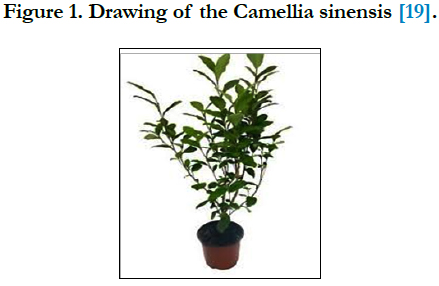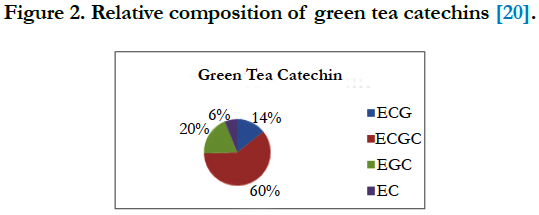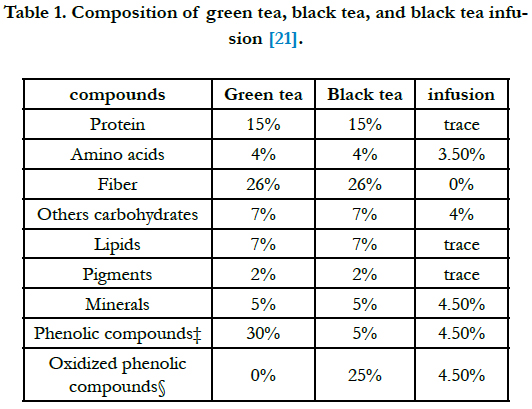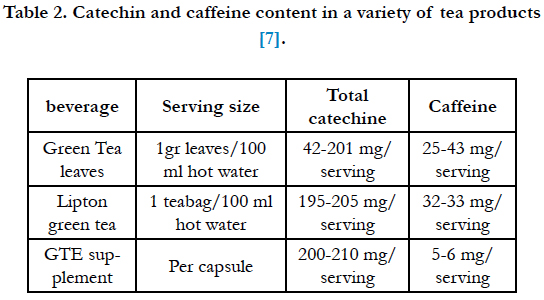Review: Fat Wars by Combination of Green Tea Extract and Caffeine, Burning more Calories and Effect on Fat Oxidation in Humans
Ramin Shafii*
Food Biotechnology Program, Faculty of Biotechnology, Assumption University, Bangkok, Thailand.
*Corresponding Author
Ramin Shafii,
Food Biotechnology Program, Faculty of Biotechnology,
Assumption University, Bangkok, Thailand.
Tel: +66(811)337217
E-mail: ramin.shafie@gmail.com
Received: January 28, 2020; Accepted: February 13, 2020; Published: February 15, 2020
Citation: Ramin Shafii. Review: Fat Wars by Combination of Green Tea Extract and Caffeine, Burning more Calories and Effect on Fat Oxidation in Humans. Int J Food Sci Nutr Diet. 2020;9(1):434-437. doi: dx.doi.org/10.19070/2326-3350-2000077
Copyright: Ramin Shafii© 2020. This is an open-access article distributed under the terms of the Creative Commons Attribution License, which permits unrestricted use, distribution and reproduction in any medium, provided the original author and source are credited.
Abstract
Green tea catechins (GTC) are polyphenolic compounds present in the unfermented dried leaves of the plant. The result from a number of studies observed consumption of GTC (270 mg to 1200 mg/day) may reduce body weight and fat. Caffeine, naturally present in green tea, also influences sympathetic nervous system (SNS) activity [3], and may act synergistically with GTC to increase energy expenditure and fat oxidation [23]. The role of green tea extract (GTE) is fat metabolism and its influence on health and exercise performance [7]. The results illustrated from a number of papers positive effects of GTE on fat metabolism at rest and during exercise, following both shorter and longer term intake. Catechin-caffeine mixtures or a caffeine-only supplementation stimulates daily energy expenditure dose dependently by 0.4-0.5 kJ mg-1 administered. Compared with placebo, daily fat-oxidation was only significantly increased after catechin-caffeine mixtures ingestion [2, 6, 7, 9].
2.Introduction
3.Fat Oxidation
4.Green Tea and Caffeine
5.Term of Duration and Effect in Human Body
6.Mechanism of Action
7.Conclusion
8.Recommendation & Future Study
9.References
Keywords
Fat Oxidation; Green Tea; Caffeine.
Introduction
In the century 21th rate of obesity, hypertension and cardiovascular disease or other disease which might come from fat significantly increased as association in United Stated reports illustrated especially in the last decade [1]. Tea divided to two types, the first one is Black Tea and second is Green tea, both are made from the fresh leaves of Camellia siensis just the way process leave is different. Health beneficial of green tea is much higher than black tea as the effect reports showed but still black tea can improve one’s health, the most high light of green tea benefits are anti-oxidant potential and anti-mutagenic capacity [2]. Green tea contains caffeine and polyphenlic combination as catechins, the largest quantities catechin found in green tea is EGCG or epigallocatechin- 3-gallate which is the most effective potential health in green tea.
Coffee has same function as green tea cause of caffeine. The caffeine will cause a measurable increase metabolic rate between 30 and 150 minutes after ingestion. The organ which has responsibility to metabolize caffeine in liver, so caffeine in the liver metabolized by cytochrome oxidase enzyme system then this enzyme has responsibility to leading to elevated glycerol and free fatty acid levels in blood plasma [3]. The most rule of caffeine is boost energy that is why use as a good source for pre-workout, the increase in energy expenditure and change in plasma substrates after caffeine ingestion resemble those caused by increased activity of the sympathetic nervous system (SNS). Observe increased plasma free fatty acid (FFA) concentrations and increased urinary catecholamine excretion, after consume the caffeine urine amount will increased then catecholamine [3].
TAC or Triacylglycerol is congested for of fat which is in muscle and adipocytes, Lipolysis isintercellular process of abandon the fatty acid from the glycerol backbone so fatty acid release to the blood then goes to muscles for oxidation [4, 5].
Fatty acid metabolism produces energy for the body and fatty acids yield the most ATP on an energy per gram basis. Maximal fat oxidation is in the during exercise so fat oxidation increases from low to moderate exercise intensities and decreases from moderate to high exercise intensities.
Some researchers have done an experiment which represented green tea extract enhance fat oxidation during walking as an exercise, the result has been showed use caffeine before exercise enhance exercise induced fat oxidation. They have used Matcha green tea powder which has catechins and caffeine and is consumed as a drink to 30 female volunteers, the result showed by boosting energy which comes from caffeine increased speed of walking, Matcha had no effect on physiological and perceived intensity responses. Matcha resulted in lower respiratory exchange rati (control: 0.84 ± 0.04; Matcha: 0.82 ± 0.04) (P < 0.01) and enhanced fat oxidation during a 30-min brisk walk (control:0.31 ± 0.10-Matcha: 0.35 ± 0.11 g•min-1) (P<0.01). Matcha green tea drinking can enhance exercise-induced fat oxidation in females [6].
Many scientists have been founded the strongest factor which influence fat oxidation is regular endurance training, because in during exercise hormonal regulation changed and increased Maximal Fat Oxidation (MFO). Duration and intensity are other two factors have directly effect to MFO, by maximum pressure exercise and longer pressure on body might increase fat oxidation [14]. In the other side other researcher has been found diet is a deal of MFO, High fat diets increase intramuscular Triacylglycerides (IMTG) concentrations while decreasing glycogen levels within muscle [15]. Pre-workout and post work out diet are direct related to fat oxidation, some research paper shows high caffeine drink can help to fat oxidation [16] also having low fat/carbohydrate diet or some light foods can help as well because during exercise the body needs energy if the body can produce this energy from food cannot use energy from the body’s fat so have lowest result of fat oxidation, moreover researchers advised the to exercise with empty stomach or just some high caffeine products [17, 18].
Green tea is one of the largest drink using in the worldwide, Asia is the largest population of use this beverage whatever Europe increased significantly over 30 years ago [19].
Figure 1. Drawing of the Camellia sinensis [19].
Green tea produce from Camellia sinensis plant, basic components of green tea that are associated with health benefits are the catechins, The four main catechins found ingreen tea are: (−)-epicatechin (EC), (−)-epicatechin-3-gallate (ECG), (−)-epigallocatechin (EGC), and(−)-epigallocatechin-3-gallate (EGCG) [20].
Figure 2. Relative composition of green tea catechins [20].
Green tea is more than only a drink because green tea contains bioactive compounds which improve health in wide range. The amount of important nutrition inside such as polyphenols has direct effect to reducing inflammation and helping to fight cancer [21]. Green tea weight contains about 30% by polyphenols and rest by other ingredients, one the other largest amount of green tea ingredient is EGCG which is natural antioxidant that help prevent cell damage [22].
Table 1. Composition of green tea, black tea, and black tea infusion [21].
One of the interesting health benefit of green tea is fat burning, by increase metabolism in human’s body can help to fat oxidation, some research has been showed that fat oxidation was increased by 17%, the result has been showed increase fat oxidation during moderate-intensity exercise and can improve insulin sensitivity and glucose tolerance in healthy, after use green tea extract (GTE) the portion of fat oxidation to total energy expenditure was higher [23].
Other amazing benefit of green tea is brain function works, so in the short term green tea can improve or lowering risk of Alzheimer's and Parkinson's. several studies in test tube and animal models showed green tea has various protective effects on neurons [24, 25].
There are list of other health benefits; 1) kill bacteria, which improves dental health and lowers risk of infection. 2) lower risk of type 2 diabetes 3) reduce risk of cardiovascular disease 4) help live longer [21].
Scientist reported effect of catechin caffeine mixtures and caffeine expense energy and fat burning, some researchers have been analyzed combination of green tea and caffeine. They have found significantly positive effect with compare with the result which used only green tea or coffee and catechin-caffeine mixtures increased thermogenesis and fat oxidation, in the other side result, they have found in the both kind of drink might increase energy whatever, compared with placebo, catechin-caffeine mixtures increased fat oxidation, in contrast to caffeine-only which did not yield a significant effect on fat oxidation and an analysis found that taking a combination of green tea extract and caffeine helped people burn 16% more fat than a placebo [2].
Term of Duration and Effect in Human Body
Green tea and caffeine both are rich sours of EGCG, duration of taking caffeine and amount of taking have many in-depending such as weight, metabolism of the person, habit of taking and exercise as well [6]. There are two term of this diet which short term and long term. Researcher has BEEN searched in both short term green tea intake and effects on resting fat metabolism and long term as well.
The type of tea, origin of the leaves and source of green tea can all influence the catechin content. Although, a cup of green tea (250 mL) contains between 100 and 300 mg of total catechins and 50 and 90 mg of caffeine (Table 2).
Table 2. Catechin and caffeine content in a variety of tea products [7].
GET is able to increase oxidation even during rest, some researcher has been studied used 3 doses of encapsulated GTE (270 mg/d EGCG + 150 mg/d caffeine), caffeine (150 mg/d) and placebo in 24 hours, the result illustrated that compared with placebo and caffeine, those persons how used GTE significantly increased 24-h fat oxidation (76.2 ± 10.6, 81.9 ± 8.7, and 103 ± 13 g/24 h, respectively) and fat oxidation were 20% higher in GET in compare with caffeine [7]. Other researcher has worked on long term and gave GTE (750 mg/d catechins + 87 mg/d caffeine) or placebo for 12 weeks. The result showed longer term GTE has the potential to increase fat oxidation and alter energy metabolism, also the result showed indicative of increased dietary fat oxidation. What is more, diet-induced thermogenesis in the 8-h post meal increased from baseline to wk 12 (51.4 and 90.3 kcal, respectively) only in the high-catechin group [7].
Mechanism of Action
One of the most important role of SNS is neurotransmitter norepinephrine in the control of thermogenesis and fat oxidation, it is conceivable that these catechins, by inhibiting COMT, result in an increase in or a more prolonged effect of norepinephrine on thermogenesis and fat metabolism or both. Some studies have been showed on the respiration rate of brown adipose tissue, a green tea extract which is rich in catechin polyphenols was more potent than were equimolar concentrations of caffeine alone in stimulating the respiration rate of brown adipose tissue [9]. The thermogenic effect of a green tea extract was significantly stouten by increase the release of norepinephrine from the sympathetic nerve terminals with the use of ephedrine [10].
Conclusion
Green tea extract combined with caffeine, each of factors individually helps to burning fat or loss weight in the two term of the time, long term and long term taken drink as well. Moreover, by combining green tea and caffeine, not only effect will be increasing also speed of burning increase as well. In the short term, caffeine can boost the metabolic rate and increase fat burning, but after a while people become tolerant to the effects and it stops working. But even if coffee doesn't make you expend more calories in the long term, there is still a possibility that it blunts appetite and helps you eat less [11].
Caffeine may slightly boost weight loss or prevent weight gain, but there's no sound evidence that increased caffeine consumption results in significant or permanent weight loss. In the several papers scientists have been founded by experimental studies, one of the best and safe method for loss weight in a balanced diet by using green tea and caffeine. In addition, these two compounds complement each other and can help you burn fat through a process called thermogenesis. In simple terms, thermogenesis is a process in which your body burns calories to produce heat using green tea extract as a drink stimulated thermogenesis and fat oxidation and thus has the potential to influence body weight and body composition via changes in both EE and substrate utilization [12, 13].
Recommendation & Future Study
Exercise is an important factor which can help for losing weight, consume green tea extract or mixed with caffeine can help for decreasing fat but if combined by exercise this effect can increase slightly, the GTE can oxidation fat during rest and activity. It is clear from many articles, catechins once ingested undergo extensive methylation, glucuronidation, and sulfation in the human intestine. The exact role of the catechin metabolites and catabolites in enhancing fat oxidation is unknown. Future study should use only physiologically relevant doses and catechin compounds to identify reasonable in vivo effects of GTE.
References
- Bose M, Lambert JD, Ju J, Reuhl KR, Shapses SA, Yang CS. The major green tea polyphenol,(-)-epigallocatechin-3-gallate, inhibits obesity, metabolic syndrome, and fatty liver disease in high-fat–fed mice. The Journal of nutrition. 2008 Sep 1;138(9):1677-83.
- Hursel R, Viechtbauer W, Dulloo AG, Tremblay A, Tappy L, Rumpler W, et al. The effects of catechin rich teas and caffeine on energy expenditure and fat oxidation: a meta‐analysis. Obesity reviews. 2011 Jul;12(7):e573-81.
- Acheson KJ, Zahorska-Markiewicz B, Pittet P, Anantharaman K, Jéquier E. Caffeine and coffee: their influence on metabolic rate and substrate utilization in normal weight and obese individuals. Am J Clin Nutr. 1980 May 1;33(5):989-97.
- Ogasawara J, Izawa T, Sakurai T, Sakurai T, Shirato K, Ishibashi Y, et al. The molecular mechanism underlying continuous exercise training-induced adaptive changes of lipolysis in white adipose cells. J Obes. 2015;2015:473430. Pubmed PMID: 26075089.
- Watt M, Spriet LL. Triacylglycerol lipases and metabolic control: implications for health and disease. Am of Physol Endocrinol Metab. 2010 Aug;299(2):E162-8. Pubmed PMID: 20071561.
- Willems MET, Şahin MA, Cook MD. Matcha Green Tea Drinks Enhance Fat Oxidation During Brisk Walking in Females. Int J Sport Nutr Exerc Metab. 2018 Sep 1;28(5):536-541. Pubmed PMID: 29345213.
- Hodgson AB, Randell RK, Jeukendrup AE. The Effect of Green Tea Extract on Fat Oxidation at Rest and during Exercise. Adv Nutr. 2013 Mar; 4(2): 129–140. Pubmed PMID: 23493529.
- Dulloo AG, Duret C, Rohrer D, Girardier L, Mensi N, Fathi M. Efficacy of a green tea extract rich in catechin polyphenols and caffeine in increasing 24-h energy expenditure and fat oxidation in humans. Am J Clin Nutr. 1999 Dec;70(6):1040-5. Pubmed PMID: 10584049.
- Dulloo AG, Seydoux J, Girardier L. Tealine and thermogenesis: interactions between polyphenols, caffeine and sympathetic activity. Int J Obes Relat Metab Disord. 1996 May;20(suppl 4):71.
- Dulloo AG, Seydoux J, Girardier L, Chantra P, Vandermander J. Green tea and thermogenesis-interactions between catechinpolyphenols, caffeine and sympathetic activity. Int J Obes Relat Metab Disord. 2000 Feb;24(2):252-8. Pubmed PMID: 10702779.
- Kim TW, Shin YO, Lee JB, Min YK, Yang HM. Effect of caffeine on the metabolic responses of lipolysis and activated sweat gland density in human during physical activity. Food Sci Biotechnol. 2010 Aug 1;19(4):1077-81.
- Rains TM, Agarwal S, Maki KC. Antiobesity effects of green tea catechins: a mechanistic review. J Nutr Biochem. 2011 Jan;22(1):1-7. Pubmed PMID: 21115335.
- Dulloo AG, Geissler CA, Horton T, Collins A, Miller DS. Normal caffeine consumption: influence on thermogenesis and daily energy expenditure in lean and post-obese human volunteers. Am J Clin Nutr. 1989 Jan;49(1):44-50. Pubmed PMID: 2912010.
- Purdom T, Kravitz L, Dokladny K, Mermier C. Understanding the factors that effect maximal fat oxidation. J Int Soc Sports Nutr. 2018 Jan 12;15:3. Pubmed PMID: 29344008.
- Spriet LL. New insights into the interaction of carbohydrate and fat metabolism during exercise. Sports Med. 2014 May;44 Suppl 1:S87-96. Pubmed PMID: 24791920.
- Ochiai M, Matsuo T. Effects of short-term dietary change from high-carbohydrate diet to high-fat diet on storage, utilization, and fatty acid composition of rat muscle triglyceride during swimming exercise. J Clin Biochem Nutr. 2009 Mar;44(2):168-77. Pubmed PMID: 19308271.
- Burke L. Re-examining high-fat diets for sports perfomance: did we call the 'nail in the coffin' too soon?. Sports Med. 2015 Nov;45 Suppl 1:S33-49. Pubmed PMID: 26553488.
- Hawley J, Leckey J. Carbohydrate dependence during prolonged, intense endurance exercise. 2015 Nov;45 Suppl 1:S5-12. Pubmed PMID: 26553495.
- Gupta DA, Bhaskar DJ, Gupta RK, Karim B, Jain A, Dalai DR. Green tea: A review on its natural anti-oxidant therapy and cariostatic benefits. Biol Sci Pharm Res. 2014;2:8-12.
- Reygaert WC. An update on the health benefits of green tea. Beverages. 2017 Mar;3(1):6.
- Chacko SM, Thambi PT, Kuttan R, Nishigaki I. Beneficial effects of green tea: a literature review. Chinese medicine. 2010 Dec;5(1):13.
- Eng QY, Thanikachalam PV, Ramamurthy S. Molecular understanding of Epigallocatechin gallate (EGCG) in cardiovascular and metabolic diseases. J Ethnopharmacol. 2018 Jan 10;210:296-310. Pubmed PMID: 28864169.
- Venables MC, Hulston CJ, Cox HR, Jeukendrup AE. Green tea extract ingestion, fat oxidation, and glucose tolerance in healthy humans. Am J Clin Nutr. 2008 Mar;87(3):778-84. Pubmed PMID: 18326618.
- Weinreb O, Mandel S, Amit T, Youdim MB. Neurological mechanisms of green tea polyphenols in Alzheimer's and Parkinson's diseases. J Nutr Biochem. 2004 Sep;15(9):506-16. Pubmed PMID: 15350981.
- Mandel SA, Amit T, Weinreb O, Reznichenko L, Youdim MB. Simultaneous manipulation of multiple brain targets by green tea catechins: a potential neuroprotective strategy for Alzheimer and Parkinson diseases. CNS Neurosci Ther. 2008 Winter;14(4):352-65. Pubmed PMID: 19040558.











